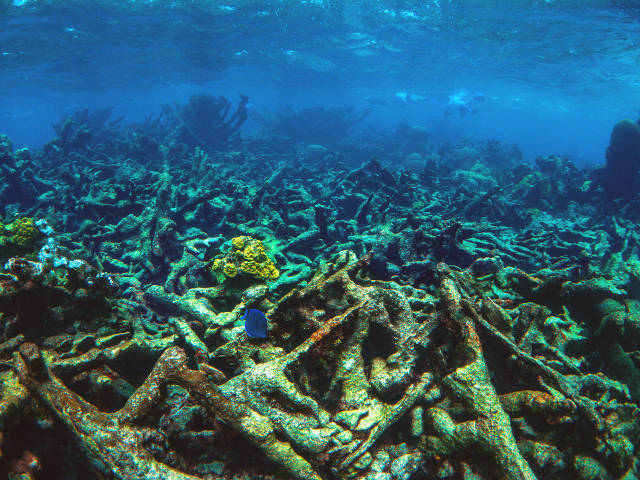
How much of the reefs have died
As a result, over 50 percent of the world's coral reefs have died in the last 30 years and up to 90 percent may die within the next century—very few pristine coral reefs still exist. The impact of our changing climate on coral reefs was manifested by the third global bleaching event in 2015/16.
How many reefs have been lost
Rising sea surface temperatures driving the loss of 14 percent of corals since 2009. Nairobi, 5 October 2021 – The “Status of Coral Reefs of the World: 2020” report, released today, documents the loss of approximately 14 per cent of the world's coral since 2009.
Have any coral reefs died
Great Barrier Reef
The most notable mass bleaching events occurred in 2016 and 2017, and a stunning 50% of Australia's famous reef died as a result. While major efforts have since been put in place to reduce coral bleaching, the scale of mortality has proven difficult for the reef system to regrow and replenish.
How much of the world’s coral reefs have been lost
Coral reefs have declined by over half since the 1950s as they suffer from the effects of climate change and overfishing. Across the world, the area that coral reefs occupy has fallen by 50% in the half century from 1957.
Why are coral reefs dying so fast
They buffer shorelines against damage from storms and provide a source of medicine. And they are dying. Coral reefs are under relentless stress from myriad global and local issues, including climate change, declining water quality, overfishing, pollution and unsustainable coastal development.
How many corals are left
According to our best estimates, half a trillion! There are thus approximately as many coral colonies in the Pacific Ocean as there are trees in the Amazon, and more corals than birds in the world. The population sizes of one fifth of the 318 species we examined each exceed one billion individuals.
Why are reefs dying
They buffer shorelines against damage from storms and provide a source of medicine. And they are dying. Coral reefs are under relentless stress from myriad global and local issues, including climate change, declining water quality, overfishing, pollution and unsustainable coastal development.
Will coral reefs exist in 20 years
Over the next 20 years, scientists estimate about 70 to 90% of all coral reefs will disappear primarily as a result of warming ocean waters, ocean acidity, and pollution. Expand that out to 2100 and it's “looking quite grim,” says Renee Setter, a marine scientist at the University of Hawaii in Manoa.
Will coral reefs go extinct
The bleaching of branching coral (Acropora sp.) is hastened by rising ocean temperatures. An international team of environmental scientists warn that the world's coral reefs are likely to disappear by 2050 without climate action. Photo by J. Roff, via Wikimedia Commons.
Are ocean reefs dying
Coral reefs around the world are indeed still at great risk. A comprehensive survey by Canadian researchers in 2021 shows that the world's oceans have lost about half of their coral cover since the 1950s.
What kills coral reefs the most
Increased ocean temperatures and changing ocean chemistry are the greatest global threats to coral reef ecosystems. These threats are caused by warmer atmospheric temperatures and increasing levels of carbon dioxide in seawater. As atmospheric temperatures rise, so do seawater temperatures.
What kills coral reefs
Pollution, overfishing, destructive fishing practices using dynamite or cyanide, collecting live corals for the aquarium market, mining coral for building materials, and a warming climate are some of the many ways that people damage reefs all around the world every day.
Have the coral reefs died before
The in-depth analysis reveals half of coral reefs have been lost since the 1950s. Scientists say climate change, overfishing and pollution are decimating these fragile ecosystems and putting communities and livelihoods in jeopardy.
How much coral is left
Our coral reefs are disappearing
Up to half of the world's coral reefs have already been lost or severely damaged. And the negative development continues. Scientists predict that all corals will be threatened by 2050 and that 75 percent will face high to critical threat levels.
Will coral reefs exist in 50 years
According to the report, which follows on from an earlier study on the health of the world's coral reefs, more than 90 percent of reefs will be threatened by 2030 and nearly all reefs will be at risk by 2050 unless action is taken now to reduce the threats.
How much coral has died in the last 10 years
Rising ocean temperatures killed about 14% of the world's coral reefs in just under a decade, according to a new analysis from the Global Coral Reef Monitoring Network. Put another way: The amount of coral lost between 2008 and 2019 is equivalent to more than all of the living coral in Australia.
Where has 50% of all coral been lost in the past 30 years
In the past 30 years, the Great Barrier Reef has lost almost 50% of its corals, says a study. The Great Barrier Reef in Australia is the largest reef system in the world.


